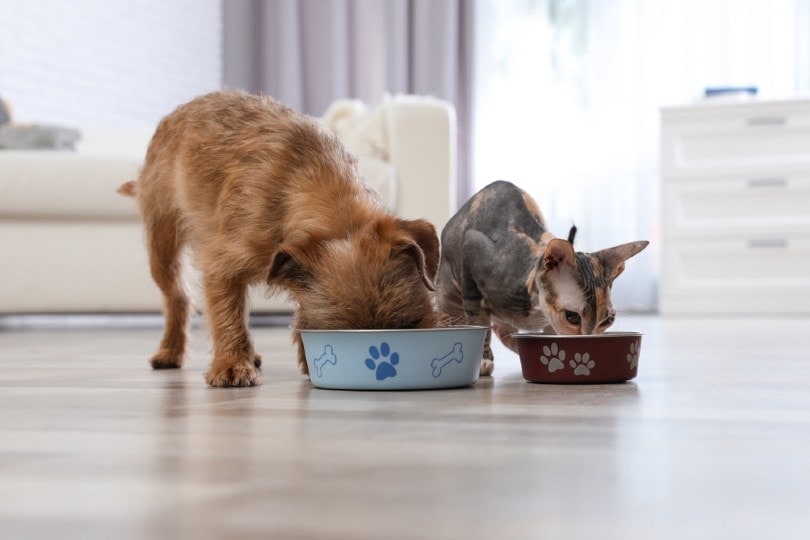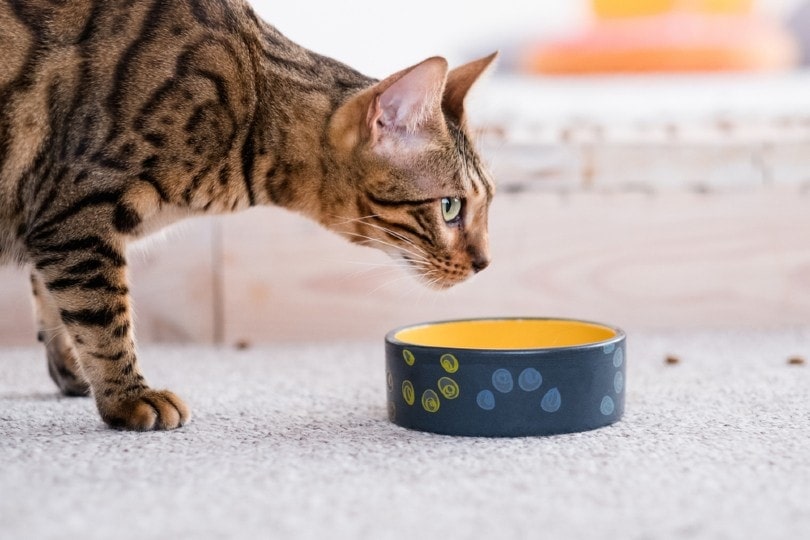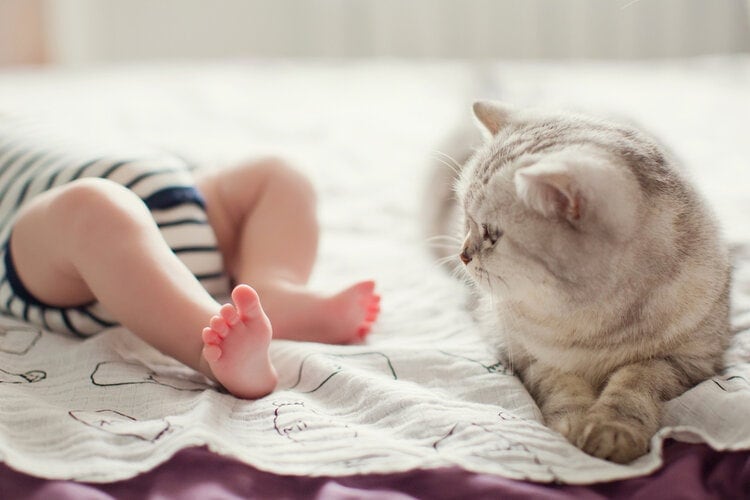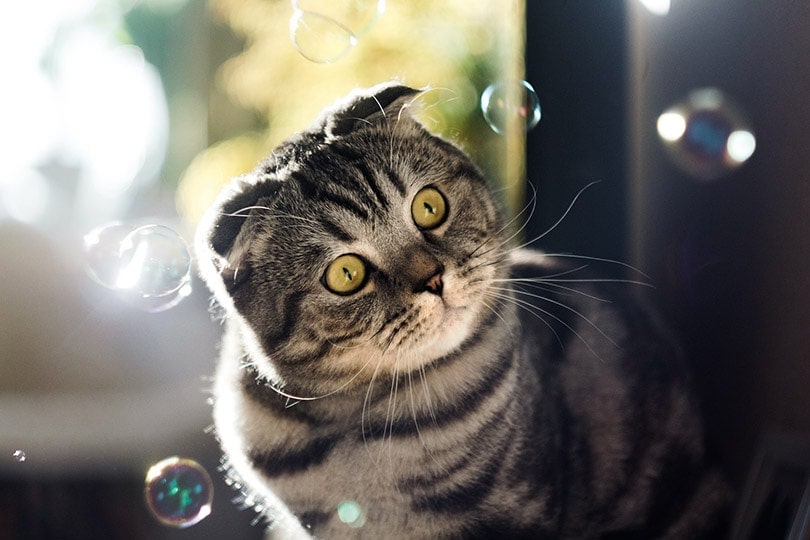Can Cats Eat Dog Food? Vet Approved Facts & Safety Guide
By Ashley Bates
Updated on

Did you forget to pick up cat food the last time you were at the store? If you’re looking for an emergency meal, you might wonder if you can toss them a dish of dog kibble. But can cats eat dog food safely?
Cats can have a few bites of dog food here and there, but it’s not a suitable substitute for them. That means a single meal won’t hurt them, assuming they find it palatable. But it would help if you never counted on dog food to match all their dietary requirements. Below, we’ll explain why.
Dog vs. Cat Diet
Cats are obligate carnivores, which means they derive their nutrients from animal-based proteins. They need plenty of amino acids to keep their muscles, skin, and bones in tip-top shape.
Dogs, on the other hand, are facultative carnivores. This means that while they need animal protein in their diet, they are still able to digest plant matter to a certain extent and may temporarily sustain themselves by doing so if the need ever arises. However, they aren’t meant to be vegetarian or vegan on a long term basis, and they aren’t omnivores either. When given a choice, dogs always favor meat over plant based foods.
Commercial dog food offers more plant-based nutrition than cat food, so the nutritional profiles don’t match.
 Nutritional Differences Between Dog & Cat Food
Nutritional Differences Between Dog & Cat Food
While dog and cat food recipes might look similar at first glance, here are some key differences:
Protein Content
While both dogs and cats require that a huge chunk of their diet is made up of protein, dogs can survive with less. Cat food contains a high amount of animal-based protein. Dogs have a pretty steady combination of plants and animal protein in their diets.
Taurine
Taurine is an irreplaceable part of a cat’s diet. Their bodies cannot produce it independently and rely on diet to give them this valuable nutrient. A lack of taurine can cause digestion trouble, vision loss, heart, neurologic and reproductive problems.

Vitamin A
Dog’s metabolize vitamin A different than cats do. Dog’s diets have a significantly lower amount of Vitamin A. Cats without appropriate levels of vitamin A have a declined appetite, a dry coat, and are prone to eye infections, in growing kittens it can cause delayed growth, and extreme cases of lack of vitamin A cause poor muscle coordination, muscle deterioration, and brain damage.
Niacin
Niacin is yet another nutrient that cats derive solely from diet alone. Dogs are able to convert the amino acid tryptophan into niacin; cats cannot do so.

Arachidonic Acid
 Can Cats Eat Dog Food Every Day?
Can Cats Eat Dog Food Every Day?
Cats absolutely cannot eat dog food every day. While you can give them a few hunks of kibble here and there, this substance will not nourish your cat’s body the way that they need. Ultimately, it leads to malnutrition, which can open a whole other realm of possible health issues.
Do Cats Like Dog Food?
Most cats will take one sniff of dog food and snub their nose at the idea. However, some cats might enjoy the taste of savory meals, like canned dog food. And then, of course, there’s always that one weird exception—a cat who is gaga about dry dog kibble.
If your cat doesn’t keep its face out of the dog’s bowl, it might be time to separate them during meals.
Proper Cat Diet
Many vets recommend a diet that consists of at least 45-50% protein for adult cats (with extra protein recommended for kittens). Cats have no problem handling diets that are higher in protein. Cats also need a high amount of fat in their diet. Though there isn’t a requirement for pet food labels to list their carbohydrate content, cats do need carbohydrates (in the form of glucose). However, unlike us, cats have an exceptional ability to synthesize glucose from animal protein. Above all, your cat’s food should have meat as the first ingredient followed by as few fillers as possible.
If you’re having trouble maintaining a multi-pet household, or you’re low on cash, check with local shelters, rescues, or veterinary facilities for emergency services. They might be able to help you out in your time of need.
There are also tons of homemade cat food options on the web. You might have all the ingredients to make a fast meal in the comfort of your own home. However, run the recipe by your vet to make sure it has all of the key ingredients your cat requires.
- Keep your cat’s diet in check with our calorie calculator here.
Can Dogs Eat Cat Food?
By now, you’ve probably determined that dog food isn’t a good long term option for cats. If you’re curious about the appropriateness of cat foods for dogs, the answer is more or less the same. Cat food often contains all the nutrition a dog needs, and isn’t toxic for dogs either.
However, the issue with feeding dogs cat food is overnutrition. The excess protein and fats which cats require aren’t necessarily beneficial for a dog. Since their bodies won’t store extra protein, the task of its elimination from their system fall to the kidneys. An excess strain on the kidneys can be detrimental in the long run. Excess fat your dog doesn’t utilize will simply be stored for later use, and might eventually lead to an obese pup.
In addition, the micronutrient requirements of cats and dogs is different too. Therefore, food intended for cats shouldn’t be given to dogs on a long-term basis.
Now that you know what you can safely feed your cat, it’s just as important to find a bowl that supports their health and well-being. With whisker-friendly bowls and a wide tray to catch any spills, our Hepper NomNom Cat Bowl is our favorite option.
Final Thoughts
Although dog food isn’t considered toxic for cats, it isn’t a good long term option for your feline. If you are looking for a quick meal replacement in an unlikely scenario where you find yourself out of cat food, you might be able to swing one dog food meal for your feline friend. But make sure it’s one meal only—and don’t make a habit of it. Cats need a particular composition of nutrients that are species-specific, just like any other animal.
You might also be interested in:
- Do Chihuahuas Get Along With Cats? What You Need to Know!
- Do Pitbulls Get Along with Cats? What You Need to Know!
Featured Image Credit: 279photo Studio, Shutterstock
















